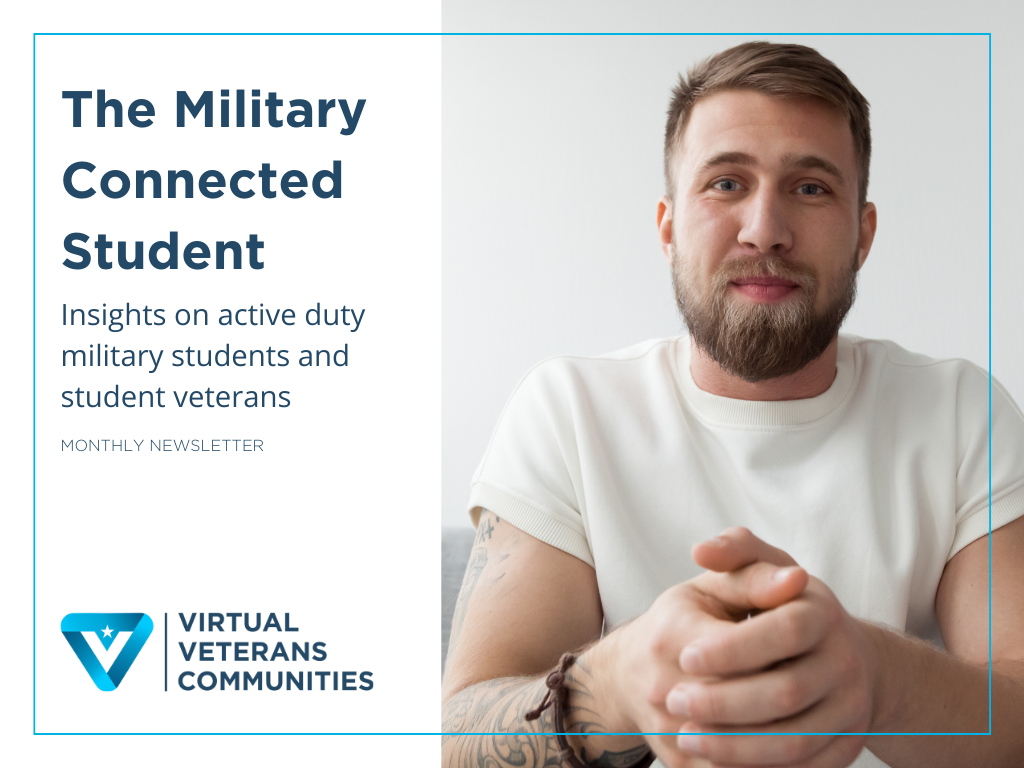How to Help Military-Connected Students Navigate Higher Ed
During the next ten years, an estimated two million service members will leave the military as veterans. Many will need quality education options to transition to meaningful civilian careers.
Currently, over 800,000 veterans and active duty service members use GI Bill®️ benefits or Tuition Assistance from the Department of Defense to pursue higher education, with growth expected. The US Department of Veteran Affairs (VA) reported that from 2008 to 2016, the number of military-connected students (students who are active duty military, veterans, and/or a spouse or dependent of a service member or veteran) enrolled in higher education increased by almost 340%.
Military-Connected Student:
Students who are active duty military, veterans, and/or a spouse or dependent of a service member or veteran
These military-connected students tend to complete their degrees at a higher rate with lower attrition. About 85% of military-connected students are considered non-traditional due to their age or marriage. Non-traditional students, as a whole, also have higher GPAs historically.
The military is a very diverse group of people, and so are military-connected students. Approximately 1 in 6 service members are Black or African-American, and 6% are Asian American and Pacific Islander. These students bring invaluable perspectives to the student body and academic community.
Combining these attributes in a military-connected student creates a well-funded, highly driven, career-oriented learner.
Academic institutions that can identify the support their students need, develop a plan to offer it and adjust as needed will thrive.
What's Standing in Their Way?
There are quite a few challenges these students face that non-military students don't, including the bureaucratic difficulties related to using their educational benefits. The Post-9/11 GI Bill®️ and other funding through the Department of Veterans Affairs can be difficult for students to understand.
Paying for school isn't the only thing weighing on the minds of these students. They also find these things challenging:
Adapting to life after the military
Dealing with the lack of structure that the military provided
Connecting with their peers
Balancing work, family and education
Degree completion
Peer support
Students often note a lack of peer support as their most significant challenge – something many veterans and military families encounter. Referred to as the military/civilian divide, this disconnect occurs when people don't have direct contact with the military. Only about one-third of adults between 18 and 29 have an immediate family member who served in the military, while in their parent's generation, 79% have that intimate connection. Not having a connection to the military increases the confusion and misunderstandings of what the military does — and why — making it hard to understand veterans when they join another community.
Military-connected students may also face aggressive targeting from academic institutions that aren't particularly concerned about supporting them holistically. Most of all, these students want to feel understood and supported in their academic decisions.
How Institutions Can Support Military-Connected Students
Academic institutions and admissions departments want to know how to serve these students better, which is why they strive to become more familiar with the nuances of the military-connected population. One of the ways to become more familiar with military-connected students is by collaborating with higher education institutions, foundations and other organizations committed to the success of military-connected students.
Veteran-forward universities know what their students want and need and put policies and plans into place to help. Here are some of the ways they do that.
Respect veterans' unique transition needs
Facilitation of financial support is only a baseline standard
Understand and address short-term needs and long-term potential
Veteran programs tailored to better inclusion, not isolation
Beyond ‘crisis support' to positive inclusion
Speak to shared experiences
Create veterans-focused groups, with peers in the lead, and host veterans-focused events that integrate full campus community
Embrace the wider veteran community
Support and collaborate with campus-focused veteran organizations along the full spectrum of the transition journey
Military-connected students believe their military experience directly aids them in pursuing a college degree. They are resilient despite difficult events or stressful environments. Establishing specific counseling and mental health programs can help them continue to succeed.
How VVC Can Help Get You Started
At Virtual Veterans Community (VVC), you'll find a mission-driven organization whose dedication to improving higher education and employment outcomes for military-connected students is at the forefront of everything we do.
VVC designs programs to be financially self-sufficient to increase cost-effectiveness. The programs VVC designs can be scaled up or down quickly and integrate programs to support military-connected students. VVC is excellent at helping fill in the gaps between what this unique group of students needs and what an institution offers. VVC supports public, private, urban, rural, technical and comprehensive higher education institutions.
The VVC team offers specialized experience and focuses on marketing to, enrolling and supporting military-connected students – because most of them have a military background, when combined with diverse personal experiences, helps create a comprehensive plan. The team also offers a reduced risk because they are incredibly well-versed in the policies, processes, compliance and reporting involved with the Department of Defense and VA programs.
By providing robust reporting and analysis, the team at VVC can inform institutional leaders and support data-driven resource allocation around enrollment and support of military-connected students.
Virtual Veterans Communities exists for one reason, to support institutions serving the students who serve our country. Whether you need a proven approach to on-base marketing, a turnkey online community, one-on-one coaching for military-connected students or team development, VVC stands ready.


